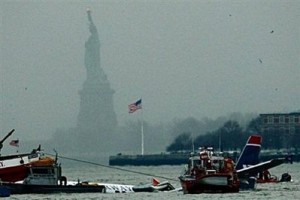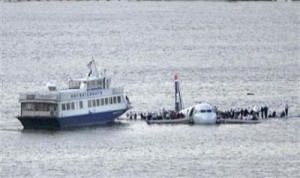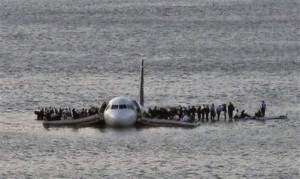January 23rd, 2009 by Frank LaBanca, Ed.D.
 Last week I heard about the amazing water landing of the US Airlines flight on the Hudson River in New York City. I was in the midst of many projects and didn’t have a chance to truly appreciate the magnitude of what had happened until I viewed a slide show of pictures. The images are breathtaking, and I hope the link I am providing to this event lasts a long time.
Last week I heard about the amazing water landing of the US Airlines flight on the Hudson River in New York City. I was in the midst of many projects and didn’t have a chance to truly appreciate the magnitude of what had happened until I viewed a slide show of pictures. The images are breathtaking, and I hope the link I am providing to this event lasts a long time.
What amazes me most is, in less than one minute, the pilot identifies a problem, creates a strategy for solution with multiple options, selects the best option, and finally executes the option in a near-flawless fashion. This is what creativity and 21st-century skills is all about! (Well, maybe we don’t need to teach students how to crash land a plane, but we do need to give them the skills, knowledge, and dispositions to successfully navigate the challenges that they will undoubtedly encounter in their future.)
 This situation makes me really consider the creative mind, in this case, the pilot. Preparedness certainly favored this mind, and the expertise displayed in the choices made were enhanced by previous experience. Sandy Kay (1994) defined creativity (specifically problem finding) in terms of an individual finding, defining, or discovering an idea or problem “not predetermined by the situation.”. This definition is problematic because it assumes there are no underlying or situated factors that might influence decision making factors. There are boundaries and parameters that are required for individuals engaging in creative problem finding and solving behaviors that are established by the field of study and the domain-culture (i.e., Csikszentmihalyi, 1990). These predetermined factors must surely influence the nature of the problems individuals attempt to solve.
This situation makes me really consider the creative mind, in this case, the pilot. Preparedness certainly favored this mind, and the expertise displayed in the choices made were enhanced by previous experience. Sandy Kay (1994) defined creativity (specifically problem finding) in terms of an individual finding, defining, or discovering an idea or problem “not predetermined by the situation.”. This definition is problematic because it assumes there are no underlying or situated factors that might influence decision making factors. There are boundaries and parameters that are required for individuals engaging in creative problem finding and solving behaviors that are established by the field of study and the domain-culture (i.e., Csikszentmihalyi, 1990). These predetermined factors must surely influence the nature of the problems individuals attempt to solve.
IMHO, the pilot was capable of such a creative and successful act because he had the necessary expertise, coupled with a situation that mandated immediate action. Without his experiences as a pilot and a safety consultant he could NOT have been as creative as he was.
 In terms of education, the lesson seems to be that we need to engage students in authentic experiences that challenge them to develop skill sets that allow them to solve problems well. From a situated cognitive framework, becoming members of a community of practice – practicing both the trade and the thinking of professionals – is a necessary tool to become a productive, contributing member of a 21st-century society.
In terms of education, the lesson seems to be that we need to engage students in authentic experiences that challenge them to develop skill sets that allow them to solve problems well. From a situated cognitive framework, becoming members of a community of practice – practicing both the trade and the thinking of professionals – is a necessary tool to become a productive, contributing member of a 21st-century society.